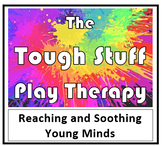Play is children making sense of the world:
In play therapy, children are empowered with choice. Choice provides a sense of control and autonomy.
Children are free to choose from a variety of creative media, that includes art materials, clay, dance, movement, games, percussion instruments, playdough, puppets, role-play, stories and a therapeutic sand tray. Creative opportunities can free children to express themselves deeply.
Sometimes there’s fun and laughter, sometimes there isn’t; but play should not to be underestimated.
The therapist accepts and respects the views of the child, this brings growth in independence and resilience.
As their therapeutic journey continues with opportunities to explore, work through and make sense of things, the child feels listened to and understood. Frustrations ease, the child learns to manage their feelings better; a soothed and happier child emerges.
Children are free to choose from a variety of creative media, that includes art materials, clay, dance, movement, games, percussion instruments, playdough, puppets, role-play, stories and a therapeutic sand tray. Creative opportunities can free children to express themselves deeply.
Sometimes there’s fun and laughter, sometimes there isn’t; but play should not to be underestimated.
The therapist accepts and respects the views of the child, this brings growth in independence and resilience.
As their therapeutic journey continues with opportunities to explore, work through and make sense of things, the child feels listened to and understood. Frustrations ease, the child learns to manage their feelings better; a soothed and happier child emerges.
therapy within safe parameters:
Play therapy is a confidential process which means working one to one with children.
At The Tough Stuff the child’s safety and best interest are paramount.
For further details, please go to Keeping Children Safe.
Prior to play therapy my career was as a primary school teacher.
One fundamental advantage to play therapy is that it is not talk-based. The play ‘does the talking’.
Children often find it difficult to express themselves verbally, usually because they haven’t yet developed sufficient language skills. Adults sometimes find this frustrating.
At The Tough Stuff the child’s safety and best interest are paramount.
For further details, please go to Keeping Children Safe.
Prior to play therapy my career was as a primary school teacher.
One fundamental advantage to play therapy is that it is not talk-based. The play ‘does the talking’.
Children often find it difficult to express themselves verbally, usually because they haven’t yet developed sufficient language skills. Adults sometimes find this frustrating.
who can play therapy help?
Play therapy is often fantastic at supporting primary aged children (4-11 years); and because it meets individuals ‘where they are at’, chronological age is not hugely significant.
Play therapy can be effective in reaching children with special educational needs or disability (SEND), speech difficulties, English as Additional Language (EAL), elective mutism or younger children, because play and creativity is the communication. Surprisingly, language skills may even improve as a result.
Play therapy can help clients with the following difficulties or experiences:
Play therapy can be effective in reaching children with special educational needs or disability (SEND), speech difficulties, English as Additional Language (EAL), elective mutism or younger children, because play and creativity is the communication. Surprisingly, language skills may even improve as a result.
Play therapy can help clients with the following difficulties or experiences:
- Abuse – experience of or witness to
- Academic under achievement
- Anger or rage
- Anxiety or anxious behaviours (restless, withdrawn, agitated)
- Attachment insecurities
- Attendance inconsistencies
- Attention Deficit Disorder (ADD)
- Autistic tendencies/Autistic Spectrum Disorder (ASD)
- Behaviour challenges
- Bereavement or loss
- Concentration
- Developmental Delay
- Disadvantage or Displacement
- Domestic Violence
- English as an Additional Language (EAL)
- Family tension or separation
- Life shifts that are hard to come-to-terms with
- Low-self esteem
- Medical diagnosis that leads to emotional distress
- Neglect
- Oppositional Disorders
- Peer relationships
- Resilience
- Special Educational Needs (SEN)
- Speech difficulties
- Trauma
not just for children:
The creative, varied and playful nature of this type of therapy means that older children and adults can benefit from sessions too.
When adults experience this type of therapy, they are often blown-away by the powerful insight into their own feelings they gain. It facilitates expression beyond words!
When adults experience this type of therapy, they are often blown-away by the powerful insight into their own feelings they gain. It facilitates expression beyond words!
